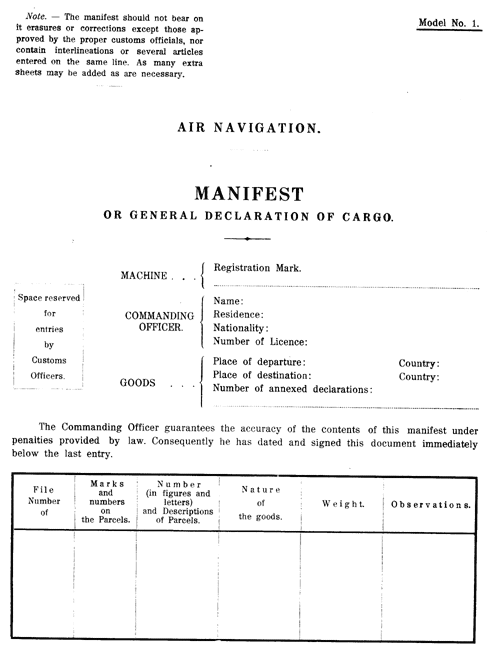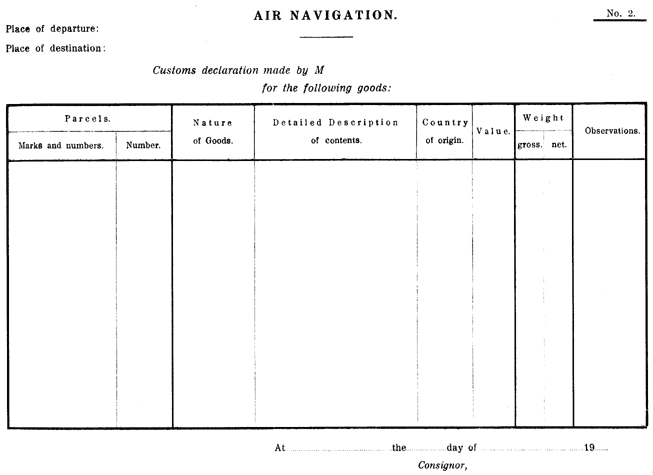ANNEX H.
CUSTOMS.
GENERAL PROVISIONS.
1.
Any aircraft going abroad shall depart only from aerodromes specially designated by the customs administration of each contracting State, and named "customs aerodromes". Aircraft coming from abroad shall land only in such aerodromes.
2.
Every aircraft which passes from one State into another is obliged to cross the frontier between certain points fixed by the contracting States. These points are shown on the aeronautical maps.
3.
All necessary information concerning customs aerodromes within a state, including any alterations made to the list and any corresponding alterations necessary on the aeronautical maps and the dates when such alterations become valid, and all other information concerning any international aerodromes which may be established, shall be communicated by the States concerned to each other and to the International Commission for Air Navigation which shall notify such information to all of the contracting States. The contracting States may agree to establish international aerodromes at which there may be joint customs serviced for two or more States.
4.
When, by reason of a case of force majeure, which must be duly justified, an aircraft crosses the frontier at any other point than those designated, it shall land at the nearest customs aerodrome on its. route. If it is forced to land before reaching this aerodrome it shall inform the nearest police or customs authorities.
It will only be permitted to leave again with the authorisation of these authorities, who shall, after verification, stamp the log book and the manifest provided for in paragraph 5; they shall inform the pilot of the customs aerodrome where he must necessarily carry out the formalities of customs clearance.
5.
Before departure, or immediately after arrival, according to whether they are going to or coming back from a foreign country, pilots shall show their log books to the authorities of the aerodrome and, if necessary, the manifest of the goods and supplies for the journey which they carry.
6.
The manifest is to be kept in conformity with the attached form No 1.
The goods must be the subject of detailed declarations in conformity with the attached form No 2, made out by the senders.
Every contracting State has the right to prescribe for the insertion either on the manifest or on the customs declaration of such supplementary entries as it may deem necessary.
7.
In the case of an air craft transporting goods the customs officer, before departure, shall examine the manifest and declarations, make the prescribed verifications and sign the log book as well as the manifest. He shall verify his signature with a stamp. He shall seal the goods or sets of goods, for which such a formality is required.
On arrival the customs officer shall ensure that the seal is unbroken, shall pass the goods, shall sign the log book and keep the manifest. In the case of an aircraft with no goods on board, the log book only shall be signed by the police and customs officials.
The fuel on board shall be liable to customs duties provided the quantity thereof does not exceed that needed for the journey as defined in the log book.
8.
As an exception to the general regulations, certain classes of aircraft, particularly postal aircraft, aircraft belonging to aerial transport companies regularly constituted and authorised and those belonging to members of recognised touring societies not engaged in the public conveyance of persons or goods, may be freed from the obligation of landing at a customs aerodrome and authorised to begin or end their journey at certain inland aerodromes appointed by the customs and police administration of each State at which customs formalities shall be complied with.
However, such aircraft shall follow the normal air-route, and make their identity known by signals agreed upon as they fly across the frontier.
REGULATIONS APPLICABLE TO AIRCRAFT AND GOODS.
9.
Aircraft landing in foreign countries are in principle liable to customs duties if such exist.
If they are to be re-exported, they shall have the benefit of the regulations as to permit by bond or deposit of the taxes.
In the case of the formation between two or more countries of the Union of touring societies, the aircraft of the said countries will have the benefit of the regulations of the "Tryptique".
10.
Goods arriving by aircraft shall be considered as coming from the country where the log book and manifest have been signed by the customs officer.
As regards their origin and the different customs regimes, they are liable to the regulations of the same kind as are applicable to goods imported by land or sea.
11.
With regard to goods exported in discharge of a temporary receiving or bonded account or liable to inland taxes, the senders shall prove their right to send the goods abroad by producing a certificate from the customs of the place of destination.
AIR TRANSIT.
12.
When an aircraft to reach its destination must fly over one or more contracting States, without prejudice to the right of sovereignty of each of the contracting States, two cases must be distinguished:
1. If the aircraft neither sets down non takes up passengers or goods, it is bound only to keep to the normal air route and make itself known by signals when passing over the points designated for such purpose.
2. In other cases, it shall be bound to land at a customs aerodrome and the name of such aerodrome shall be entered in the log book before departure. On landing, the customs authorities shall examine the papers and the cargo, and take, if need be, the necessary steps to ensure the re-exportation of the craft anal goods or the payment of the dues.
The provisions of paragraph 9 (2) are applicable to goods to be re-exported.
If the aircraft sets down or takes up goods, the customs officer shall verify the fact on the manifest, duly completed, and shall affix, if necessary, a new seal.
VARIOUS PROVISIONS.
13.
Every aircraft during flight, wherever it may be, must conform to the orders from police or customs stations and police or customs aircraft of the State over which it is flying.
14.
Customs officers and excise officials, and generally speaking the representatives of the public authorities shall have free access to all starting and landing places for aircraft; they may also search any aircraft and its cargo to exercise their rights of supervision.
15.
Except in the case of postal aircraft, all unloading or throwing out in the course of flight, except of ballast, may be prohibited.
16.
In addition to any penalties which may be imposed by local law for infringement of the preceding regulations, such infringement shall be reported to the State in which the aircraft is registered and that State shall suspend for a limited time, or permanently, the certificate of registration of the offending aircraft.
17.
The provisions of this Annex do not apply to military aircraft visiting a State by special authorisation (Articles 31, 32 and 33 of the Convention), nor to police and customs aircraft (Articles 31 and 34 of the Convention).


ADDITIONAL PROTOCOL.
TO THE CONTENTION OF OCTOBER 13TH, 1919, RELATING TO THE REGULATION OF AERIAL NAVIGATION.
THE HIGH CONTRACTING PARTIES declare themselves ready to grant, at the request of signatory or adhering States who are concerned, certain derogations to Article V of the Convention, but only where they consider the reasons involved worthy of consideration.
The requests should be addressed to the Government of the French Republic who will lay them before the International Commission on Aerial Navigation provided for in Article 34 of the Convention.
The International Commission on Aerial Navigation will examine each request, which may only be submitted for the acceptance of the contracting States if it has been approved by at least a two-thirds majority of the total possible number of votes, that is to say, of the total number of votes which could be given if the Representatives of all the States were present.
Each derogation which is granted must by expressly accepted by the contracting States before coming into effect.
The derogation granted will authorise the contracting State profiting thereby to allow the aircraft of one or more named non-contracting States to fly over its territory, but only for a limited period of time fixed by the text of the decision granting the derogation.
At the expiration of this period the derogation will be automatically renewed for a similar period unless one of the contracting States has declared its opposition to such renewal.
Further, the High Contracting Parties decide to fix June 1st, 1920, as the date up to which the present Protocol may be signed, and, on account of the bearing which the present Protocol has on the Convention of October 13th, 1919, to prolong until that date the period under which the above mentioned Convention may be signed.
DONE at Paris, the first of May nineteen hundred and twenty in a single copy which shall remain deposited in the archives of the Government of the French Republic, and of which authenticated copies will be transferred to the Contracting States.
The said copy, dated as above, may be signed up to and inclusive of the first day of June, nineteen hundred and twenty.
IN FAITH WHEREOF, the undermentioned Plenipotentiaries, whose powers have been found, have in good and due form, have signed the present Protocol, of which the French, English an Italian text will be recognised as of equal validity.
HUGH C. WALLACE.
E. DE GAIFFIER.
J. C. ARTEAGA.
DERBY.
GEORGE H. PERLEY.
ANDREW FISHER.
THOMAS MACKENZIE.
R. A. BLANKENBERG.
DERBY.
VIKYUIN WELLINGTON KOO.
RAFAEL MARTINEZ ORTIZ.
E. DORN Y DE ALSUA.
A. MILLERAND.
A. ROMANOS.
BONIN.
MATSUI.
R. A. AMADOR.
ERASME PILTZ.
JOÂO CHAGAS.
D. J. GHIKA.
DR. ANTE TRUMBIČ.
CHAROON.
STEFAN OSUSKY.
J. C-. BLANCO.

